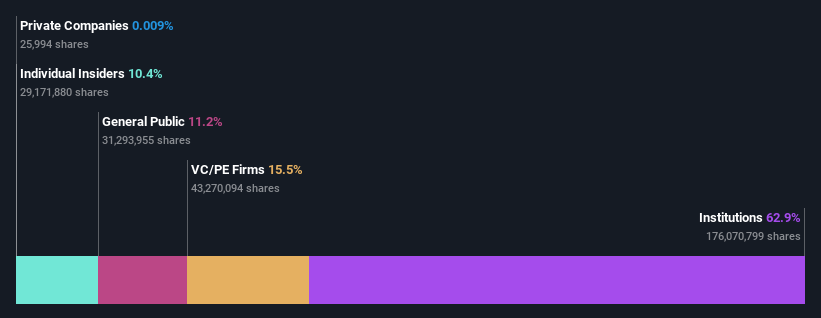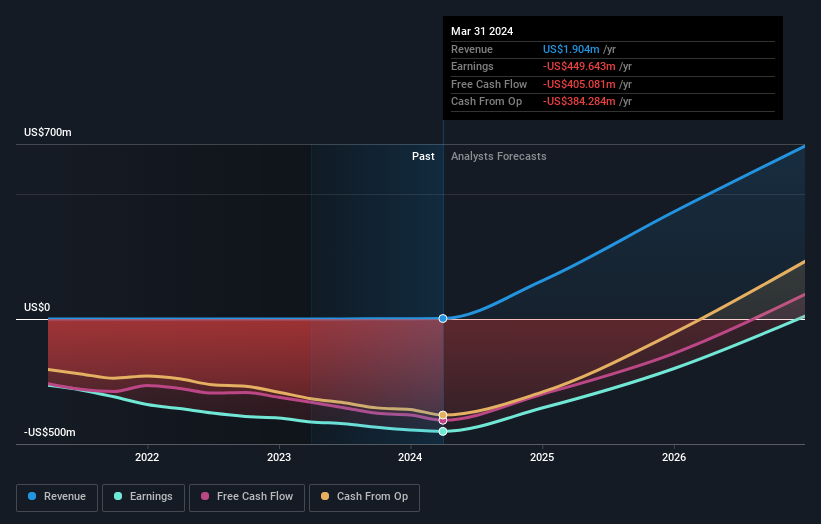- United States
- /
- Biotech
- /
- NasdaqGM:IOVA
Institutional investors may overlook Iovance Biotherapeutics, Inc.'s (NASDAQ:IOVA) recent US$112m market cap drop as long-term gains remain positive

Key Insights
- Institutions' substantial holdings in Iovance Biotherapeutics implies that they have significant influence over the company's share price
- A total of 8 investors have a majority stake in the company with 52% ownership
- Insider ownership in Iovance Biotherapeutics is 10%
To get a sense of who is truly in control of Iovance Biotherapeutics, Inc. (NASDAQ:IOVA), it is important to understand the ownership structure of the business. With 63% stake, institutions possess the maximum shares in the company. Put another way, the group faces the maximum upside potential (or downside risk).
Institutional investors endured the highest losses after the company's market cap fell by US$112m last week. However, the 14% one-year return to shareholders may have helped lessen their pain. They should, however, be mindful of further losses in the future.
Let's take a closer look to see what the different types of shareholders can tell us about Iovance Biotherapeutics.
Check out our latest analysis for Iovance Biotherapeutics

What Does The Institutional Ownership Tell Us About Iovance Biotherapeutics?
Many institutions measure their performance against an index that approximates the local market. So they usually pay more attention to companies that are included in major indices.
We can see that Iovance Biotherapeutics does have institutional investors; and they hold a good portion of the company's stock. This suggests some credibility amongst professional investors. But we can't rely on that fact alone since institutions make bad investments sometimes, just like everyone does. If multiple institutions change their view on a stock at the same time, you could see the share price drop fast. It's therefore worth looking at Iovance Biotherapeutics' earnings history below. Of course, the future is what really matters.

Institutional investors own over 50% of the company, so together than can probably strongly influence board decisions. We note that hedge funds don't have a meaningful investment in Iovance Biotherapeutics. Wayne Rothbaum is currently the company's largest shareholder with 10% of shares outstanding. The Vanguard Group, Inc. is the second largest shareholder owning 8.9% of common stock, and MHR Fund Management LLC holds about 8.6% of the company stock.
We also observed that the top 8 shareholders account for more than half of the share register, with a few smaller shareholders to balance the interests of the larger ones to a certain extent.
Researching institutional ownership is a good way to gauge and filter a stock's expected performance. The same can be achieved by studying analyst sentiments. Quite a few analysts cover the stock, so you could look into forecast growth quite easily.
Insider Ownership Of Iovance Biotherapeutics
While the precise definition of an insider can be subjective, almost everyone considers board members to be insiders. Company management run the business, but the CEO will answer to the board, even if he or she is a member of it.
Insider ownership is positive when it signals leadership are thinking like the true owners of the company. However, high insider ownership can also give immense power to a small group within the company. This can be negative in some circumstances.
It seems insiders own a significant proportion of Iovance Biotherapeutics, Inc.. It is very interesting to see that insiders have a meaningful US$302m stake in this US$2.9b business. Most would be pleased to see the board is investing alongside them. You may wish to access this free chart showing recent trading by insiders.
General Public Ownership
With a 11% ownership, the general public, mostly comprising of individual investors, have some degree of sway over Iovance Biotherapeutics. This size of ownership, while considerable, may not be enough to change company policy if the decision is not in sync with other large shareholders.
Private Equity Ownership
With a stake of 15%, private equity firms could influence the Iovance Biotherapeutics board. Some might like this, because private equity are sometimes activists who hold management accountable. But other times, private equity is selling out, having taking the company public.
Next Steps:
While it is well worth considering the different groups that own a company, there are other factors that are even more important. Consider risks, for instance. Every company has them, and we've spotted 3 warning signs for Iovance Biotherapeutics you should know about.
If you are like me, you may want to think about whether this company will grow or shrink. Luckily, you can check this free report showing analyst forecasts for its future.
NB: Figures in this article are calculated using data from the last twelve months, which refer to the 12-month period ending on the last date of the month the financial statement is dated. This may not be consistent with full year annual report figures.
New: AI Stock Screener & Alerts
Our new AI Stock Screener scans the market every day to uncover opportunities.
• Dividend Powerhouses (3%+ Yield)
• Undervalued Small Caps with Insider Buying
• High growth Tech and AI Companies
Or build your own from over 50 metrics.
Have feedback on this article? Concerned about the content? Get in touch with us directly. Alternatively, email editorial-team (at) simplywallst.com.
This article by Simply Wall St is general in nature. We provide commentary based on historical data and analyst forecasts only using an unbiased methodology and our articles are not intended to be financial advice. It does not constitute a recommendation to buy or sell any stock, and does not take account of your objectives, or your financial situation. We aim to bring you long-term focused analysis driven by fundamental data. Note that our analysis may not factor in the latest price-sensitive company announcements or qualitative material. Simply Wall St has no position in any stocks mentioned.
About NasdaqGM:IOVA
Iovance Biotherapeutics
A commercial-stage biotechnology company, develops and commercializes cell therapies using autologous tumor infiltrating lymphocyte for the treatment of metastatic melanoma and other solid tumor cancers in the United States.
High growth potential with adequate balance sheet.


